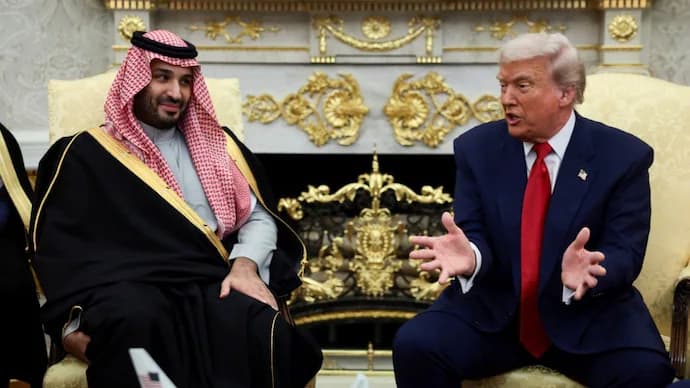We're loading the full news article for you. This includes the article content, images, author information, and related articles.
US President Donald Trump's public exoneration of Crown Prince Mohammed bin Salman for the 2018 murder of journalist Jamal Khashoggi signals a deepening of strategic ties, raising questions for Kenya and East Africa on the balance between economic interests and international justice.

WASHINGTON D.C. – United States President Donald Trump on Tuesday, November 18, 2025, publicly defended Saudi Arabian Crown Prince Mohammed bin Salman regarding the 2018 murder of journalist Jamal Khashoggi, stating the prince "knew nothing about it." This assertion, made during the Crown Prince's first official visit to the White House in seven years, directly contradicts a declassified 2021 US intelligence report which concluded that the Crown Prince approved the operation to capture or kill the journalist.
"A lot of people didn't like that gentleman that you're talking about. Whether you like him or didn't like him, things happen," Mr. Trump remarked to a reporter in the Oval Office, referring to Khashoggi. He further admonished the journalist for the question, saying, "You don't have to embarrass our guest."
The Crown Prince, often referred to by his initials MBS, called the killing a "huge mistake" and "painful," assuring that Saudi Arabia had taken steps to prevent such an event from recurring. "We did all the right steps of investigation, etcetera, in Saudi Arabia, and we've improved our system to be sure that nothing happened like that," he stated.
Jamal Khashoggi, a Washington Post columnist and critic of the Saudi government, was killed and dismembered by a team of Saudi agents inside the kingdom's consulate in Istanbul, Turkey, on October 2, 2018. The gruesome nature of the murder triggered a global outcry and strained relations between Washington and Riyadh.
In February 2021, the Office of the Director of National Intelligence released an assessment stating it had "high confidence" that Mohammed bin Salman approved the operation. The report based its assessment on the Crown Prince's absolute control over the kingdom's security and intelligence apparatus, making it "highly unlikely" that such an operation would have been conducted without his authorization. The CIA had reportedly reached the same conclusion as early as November 2018.
Despite this, the Trump administration has moved to restore and strengthen the alliance, culminating in a lavish White House welcome for the Crown Prince that included a military flyover and an honor guard. Mr. Trump praised the Crown Prince's record on human rights, calling what he has done "incredible."
While the meeting in Washington focuses on global geopolitics and multi-billion dollar investment and defense deals, the implications resonate in East Africa. Kenya maintains cordial and economically significant relations with Saudi Arabia. The Kingdom is a major destination for Kenyan migrant workers, with an estimated 150,000 to 200,000 Kenyans residing there, primarily in domestic and professional roles. Remittances from these workers are a crucial pillar of Kenya's economy.
Furthermore, Saudi Arabia is a key trading partner and investor in Kenyan development projects through the Saudi Fund for Development, financing infrastructure such as roads and water supply systems. Recently, Kenya has sought to deepen these ties, opening a new consulate in Jeddah in November 2025 to better serve its diaspora and promote trade and investment.
The US position on the Khashoggi murder presents a complex diplomatic landscape for nations like Kenya. The prioritization of strategic and economic interests over accountability for human rights violations by a major world power could set a precedent in international relations. For Kenya, which navigates its foreign policy based on pillars of peace, economic partnership, and diaspora welfare, the renewed US-Saudi alliance underscores the delicate balance required. It highlights a pragmatic, interest-driven approach to foreign policy from Washington, which could influence how regional powers in East Africa engage with global partners on sensitive issues.
Human rights organizations have criticized the rehabilitation of the Crown Prince's image on the world stage. Amnesty International has repeatedly called for an independent international investigation into the Khashoggi murder, stating that justice remains "fully blocked." The willingness of the US to move past the incident in pursuit of broader strategic goals, such as countering Iran and securing economic deals, may signal to other nations that accountability can be secondary to geopolitical alignment. This dynamic will be closely watched by governments across Africa, including Kenya, as they continue to build and maintain vital economic partnerships with both the United States and Saudi Arabia.
Keep the conversation in one place—threads here stay linked to the story and in the forums.
Sign in to start a discussion
Start a conversation about this story and keep it linked here.
Other hot threads
E-sports and Gaming Community in Kenya
Active 9 months ago
The Role of Technology in Modern Agriculture (AgriTech)
Active 9 months ago
Popular Recreational Activities Across Counties
Active 9 months ago
Investing in Youth Sports Development Programs
Active 9 months ago